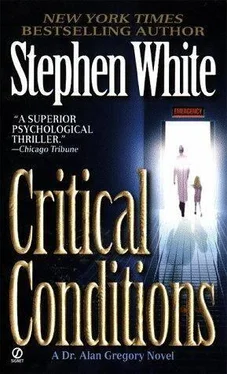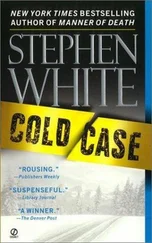Stephen White - Critical Conditions
Здесь есть возможность читать онлайн «Stephen White - Critical Conditions» весь текст электронной книги совершенно бесплатно (целиком полную версию без сокращений). В некоторых случаях можно слушать аудио, скачать через торрент в формате fb2 и присутствует краткое содержание. Жанр: Триллер, на английском языке. Описание произведения, (предисловие) а так же отзывы посетителей доступны на портале библиотеки ЛибКат.
- Название:Critical Conditions
- Автор:
- Жанр:
- Год:неизвестен
- ISBN:нет данных
- Рейтинг книги:4 / 5. Голосов: 1
-
Избранное:Добавить в избранное
- Отзывы:
-
Ваша оценка:
- 80
- 1
- 2
- 3
- 4
- 5
Critical Conditions: краткое содержание, описание и аннотация
Предлагаем к чтению аннотацию, описание, краткое содержание или предисловие (зависит от того, что написал сам автор книги «Critical Conditions»). Если вы не нашли необходимую информацию о книге — напишите в комментариях, мы постараемся отыскать её.
Critical Conditions — читать онлайн бесплатно полную книгу (весь текст) целиком
Ниже представлен текст книги, разбитый по страницам. Система сохранения места последней прочитанной страницы, позволяет с удобством читать онлайн бесплатно книгу «Critical Conditions», без необходимости каждый раз заново искать на чём Вы остановились. Поставьте закладку, и сможете в любой момент перейти на страницу, на которой закончили чтение.
Интервал:
Закладка:
“Is she awake? Will she know her sister has come down to see her?”
Trent said, “Oh, she’ll know. She knows already. I can feel it.”
The work around the toddler was being done in whispers and hushes. The motions of the health care workers were rehearsed and precise. Their voices conveyed their urgency and their intensity and masked their fears.
Behind me, a monitor beeped on the far side of the room. It was a warning bell, not a clarion call. Not an alarm. A nurse hustled toward the unattended bed. The body in it was so small I couldn’t be certain the crib was occupied.
Behind me, near the nursing station, someone dropped an empty can of Sprite. It sounded like a bomb going off. As it rolled across the linoleum, it reminded me of a military drum roll.
A phone rang.
Two people stepped back from Chaney’s bed, just one step back. A nurse stepped away, too, leaving three staff people behind. One of the remaining nurses reached up and adjusted a control on Chaney’s monitor. Then she played with another dial. The last two people at Chaney’s bedside were leaning over the child. They, too, stood upright. One of them, a husky man with a full beard, pulled his stethoscope from his ears and hung it casually around his neck. He shook his head and said something. I would have tried to read his lips, but I couldn’t even find them underneath the shroud of his facial hair.
I wanted to scream. I didn’t. But I thought, Oh God, she’s dead. It all seemed so uneventful. The anticipation of death is all pathos. Death itself is just a baby’s sigh.
Those last two docs, both in white lab coats, started walking toward John Trent, who was standing still as a monument beside me.
My eyes were fixed on the bed, on the sisters. Merritt was in Chaney’s bed, on her side, resting on one elbow, with Chaney’s tiny body curled against hers. Merritt’s free hand caressed her little sister’s face, tracing soft ellipses on the dusky cheeks that were visible above the transparent oxygen mask that was clouded with mist.
The bearded pulmonologist introduced himself to John Trent. He said, “Respirations just came down to around forty, Mr. Trent, and her oxygen saturation is up. We’re not out of the woods, but it’s good news. We’re getting new blood gases. Hopefully, they’ll be better, much better.”
Merritt tucked her head in close to her sister’s ear. I saw her lips move and I knew she was talking. She didn’t try to hide it. She didn’t care that I knew that she was talking, she didn’t care that anyone else knew. She was locked tight to her sister and was whispering magical sounds into a conduit that led directly to her sister’s will.
John asked the pulmonologist, “Did she start getting better before her big sister got here, or after?”
The doctor’s face said he thought the question was curious. He said, “After.”
I watched as the doctor examined Trent’s face. “We’ll keep her down here overnight, of course, just to be sure,” he said, and walked away, back toward Chaney’s bed.
I said, “You knew, John? How?”
He replied, “I didn’t know. I guessed. I hoped. I don’t have much faith left, but I felt a lot right then, when she came down, when she hugged me, and especially as they touched, Chaney and Merritt. I felt it deep inside. It was powerful, profound.” He closed his fist against his chest. “What I was thinking was that I’d just located my soul.”
“What did you say to her? To Merritt, when she first came down?”
“I told her that no matter what anybody else said, no matter what she’d heard from you upstairs, no matter how somber the doctors looked or how bad Chaney looked, that she wasn’t down here to say good-bye to her sister.”
Brenda burst through the door behind us.
Twenty
There are many permutations of hunger. I was feeling most of them by the time I left Children’s after returning Merritt to the psychiatric unit. I couldn’t magically transport Lauren back from Washington. And I couldn’t do anything about the dual tragedies unfolding for Merritt and Chaney, but I took the opportunity of being in Denver to drive to the west side of town and treat myself to some Mexican food at Tacquería Patzcuaro. The carnitas were as good as I remembered. After dinner, I picked up some goodies at the Denver Bread Company before heading north on I-25 toward home.
Emily heard my car coming down the lane and was bouncing off the walls, and ceiling, of her dog run as I stepped out of the car. She wasn’t accustomed to being in doggie jail for long hours, but with Lauren out of town my daily absences in Denver to treat Merritt were causing Emily some unfortunate incarceration problems.
She wanted to pee, she wanted food, and she wanted to chase and kill tennis balls. Deciphering which of the activities was most important to her at that moment felt a little like trying to decide precisely what Merritt had been telling me with her limited communicative repertoire of half-smiles and narrowing eyes.
Emily peed before all else, her abundant urine pooling in the dust like a miniature Lake Gatorade.
I said, “You want some dinner?”
She jumped in the air, spinning 180 degrees to starboard. That meant an enthusiastic yes, as did the identical spin to port. She had forgotten, temporarily, about throttling the evil tennis balls.
I laid out a bowl of food and some fresh ice water for her and called Lauren at her parents’ house in Washington. No one answered and I left a message. I needed to talk with Lauren to try to work through some of the intensity that was buzzing in my head. I needed to feel her skin against mine. I needed to smell her hair and I needed to be seduced and to make love so slowly it lasted all night. But Lauren was a thousand miles away, and I had never believed in the asceticism of cold showers.
I stripped off my work clothes and pulled on some reflective Lycra and a windbreaker, checked the air pressure and the lights on my bike, and took off for an evening ride. I knew even thirty hard minutes would help clear my head of confusion.
My ride had taken me no more than two miles from my house when my pager went off. I had to stop the bike to read the screen on my beeper, which was flashing a number I didn’t recognize. Although I was tempted to ignore the page for now and complete my ride, I didn’t. There were too many crises nearing a boil in my vicinity. It didn’t feel prudent to ignore one of them at random.
Emily acted, again, like I’d been gone all day. I worried sometimes about her internal clock. Her stomach full, her bladder empty, the tennis balls were her only focus in life. I threw one for her, then another. She waited for me to throw yet another as I put my bicycle away. To my amazement, she heeded my low whistle, joined me at the front door, and followed me into the living room. Still wearing my bicycle cleats, I punched in the number from my pager.
A female said, “Hello.”
“This is Dr. Alan Gregory, I’m returning a page to this number.”
“Oh, thank you, Dr. Gregory. This is Marie Monroe. Miggy Monroe? We talked yesterday afternoon about my daughter, Madison. Remember me?”
“Yes,” I said, “of course.” I’d called Madison’s mother to get permission to meet with her daughter.
“Madison didn’t show up at school this afternoon. They called me at work, at the library, and told me. And she hasn’t come home yet, and she hasn’t called, and I’m really worried and I wonder if you would have any idea where she might have gone.” She was breathless but seemed to be making an effort to speak in a normal voice.
“Is this unusual for her, Ms. Monroe? Skipping classes, not coming home? Has she ever done it before?”
“No, not for this long, not that I know of. She always calls, well, most of the time, anyway. I’ve had trouble with her on weekends, sometimes, you know, staying out late. But not during the school week.” She exhaled loudly as she recognized that I wasn’t going to be of any help. “You don’t know where she is, do you?” Her voice was decompressing, gliding downhill toward despair.
Читать дальшеИнтервал:
Закладка:
Похожие книги на «Critical Conditions»
Представляем Вашему вниманию похожие книги на «Critical Conditions» списком для выбора. Мы отобрали схожую по названию и смыслу литературу в надежде предоставить читателям больше вариантов отыскать новые, интересные, ещё непрочитанные произведения.
Обсуждение, отзывы о книге «Critical Conditions» и просто собственные мнения читателей. Оставьте ваши комментарии, напишите, что Вы думаете о произведении, его смысле или главных героях. Укажите что конкретно понравилось, а что нет, и почему Вы так считаете.












